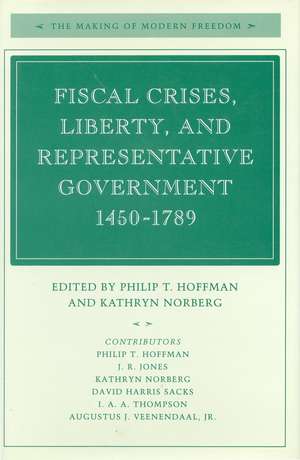Fiscal Crises, Liberty, and Representative Government 1450-1789: The Making of Modern Freedom
Editat de Philip Hoffman, Kathryn Norbergen Limba Engleză Paperback – 2002
This volume, one of the books in the "Making of Modern Freedom" series, is a collection of essays by eminent historians who explore the relationship between state finance and political development in fifteenth and sixteenth century Europe. They analyze how during this period European states were engaged in nearly continuous warfare and how those warfares produced fiscal crises. As a result, rulers were forced to enter into novel fiscal agreements with their subjects, often providing their subjects more political power, in exchange.
The volume begins with two essays on England. David Harris Sacks traces the politics of government finance from the fifteenth century to the eve of the Civil War, and J. R. Jones carries the story forward into the eighteenth century, when representative government was jeopardized by new and powerful financial interests. The third essay, by Augustus J. Veenendaal, Jr., explains why the Netherlands' exceptional ability to raise money by taxes and loans allowed them to wage war without the severe financial difficultes experiencd by other European powers. Two essays on Spain by I. A. A. Thompson follow the changing fortunes of the Cortes of Castile, relating its role to the desperate manipulation of Spanish fiscal policy as it came into conflict with the dearly held liberties of Castilian citizens.
The two final essays deal with the consequences of absolutism in France. Philip T. Hoffman details the fiscal effect of noble privileges and explores the political ramifications of the country's repeated financial crises, and Kathryn Norberg explains why the fiscal crisis of 1789 finally brought down the monarchy.
The volume begins with two essays on England. David Harris Sacks traces the politics of government finance from the fifteenth century to the eve of the Civil War, and J. R. Jones carries the story forward into the eighteenth century, when representative government was jeopardized by new and powerful financial interests. The third essay, by Augustus J. Veenendaal, Jr., explains why the Netherlands' exceptional ability to raise money by taxes and loans allowed them to wage war without the severe financial difficultes experiencd by other European powers. Two essays on Spain by I. A. A. Thompson follow the changing fortunes of the Cortes of Castile, relating its role to the desperate manipulation of Spanish fiscal policy as it came into conflict with the dearly held liberties of Castilian citizens.
The two final essays deal with the consequences of absolutism in France. Philip T. Hoffman details the fiscal effect of noble privileges and explores the political ramifications of the country's repeated financial crises, and Kathryn Norberg explains why the fiscal crisis of 1789 finally brought down the monarchy.
Preț: 214.22 lei
Nou
Puncte Express: 321
Preț estimativ în valută:
40.99€ • 42.91$ • 34.12£
40.99€ • 42.91$ • 34.12£
Carte disponibilă
Livrare economică 10-24 martie
Preluare comenzi: 021 569.72.76
Specificații
ISBN-13: 9780804741927
ISBN-10: 0804741921
Pagini: 408
Dimensiuni: 152 x 229 x 30 mm
Greutate: 0.52 kg
Ediția:1
Editura: Stanford University Press
Colecția Stanford University Press
Seria The Making of Modern Freedom
ISBN-10: 0804741921
Pagini: 408
Dimensiuni: 152 x 229 x 30 mm
Greutate: 0.52 kg
Ediția:1
Editura: Stanford University Press
Colecția Stanford University Press
Seria The Making of Modern Freedom
Descriere
These essays focus on the growth of representative institutions and the mechanics of European state finance from the end of the Middle Ages to the French Revolution.




















